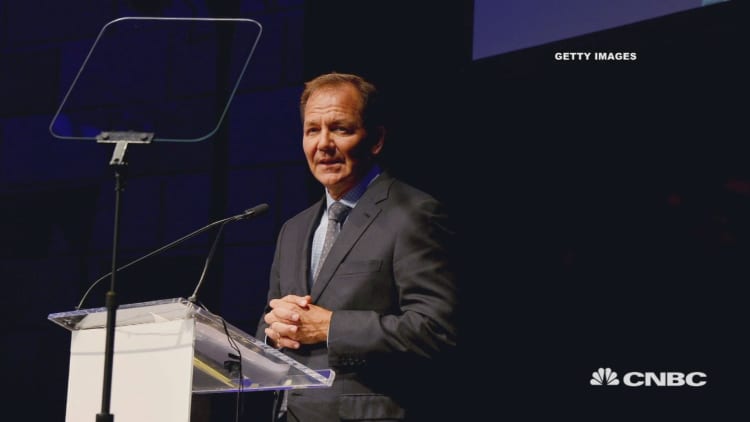
Paul Tudor Jones, the hedge fund manager who called the October 1987 crash, gave a stark warning about the financial markets.
"We have the strongest economy in 40 years, at full employment. The mood is euphoric. But it is unsustainable and comes with costs such as bubbles in stocks and credit," Jones said in an interview with Goldman Sachs sent to the bank's clients in a note Wednesday. "With rates so low, you can't trust asset prices today. And if you can't tell by now, I would steer very clear of bonds. … Bonds are the most expensive they've ever been by virtually any metric. They're overvalued and over-owned."
The hedge-fund manager blasted the tax reform bill and Congress' budget spending bill.
The Republican tax overhaul, which President Donald Trump signed into law in December, lowered the corporate tax rate to 21 percent from 35 percent. Jones forecasts inflation will rise as a result.
"I think the recent tax cuts and spending increases are something we will all look back on and regret. ... Together [they] will give us a budget deficit of 5% of GDP — unprecedented in peacetime outside of recessions," Jones said. "This reminds me of the late 1960s when we experimented with low rates and fiscal stimulus to keep the economy at full employment and fund the Vietnam War. ... We are setting the stage for accelerating inflation, just as we did in the late '60s."
To trade in such an environment, the hedge-fund manager recommended investors stay in cash or buy commodities and "hard assets." He gave a "conservative" 3.75 percent year-end target for the U.S. 10-year Treasury yield.
The U.S. 10-year Treasury yield, which moves inversely to bond prices, had climbed to a four-year high of 2.95 percent last month after the strong January jobs report. The yield traded at 2.83 percent Thursday.
This wasn't the first time the famed-macro trader warned investors about investing in bonds.
"We are in the throes of a burgeoning financial bubble," Jones wrote in a note to clients in early February. "If I had a choice between holding a U.S. Treasury bond or a hot burning coal in my hand, I would choose the coal."
Other big-name investors have called out the overvaluation in the fixed income market and the perils of inflation. Warren Buffett told CNBC on Monday he believes long-term investors should buy stocks over bonds.
"If you had to choose between buying long-term bonds or equities, I would choose equities in a minute," Buffett said.
In his annual letter to Berkshire Hathaway shareholders released on Saturday, the Oracle of Omaha recommended investors stay in equities due to the negative impact from inflation on the purchasing power of fixed-income holdings.
A spokesman for Tudor said the firm has nothing to add beyond what was in the interview text.
— CNBC's Patricia Martell contributed to this report.


